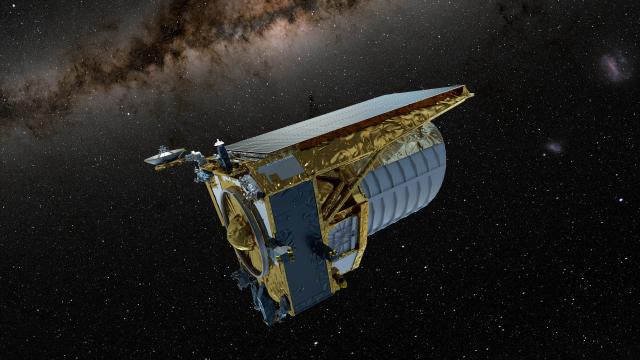The European Space Agency’s (ESA) Euclid telescope has been gradually losing its vision as layers of water molecules have frozen onto its mirrors. That’s bad news for a mission tasked with observing the dark universe using super-sensitive cameras, but the team behind the telescope has come up with a plan to keep Euclid warm in the cold depths of space.
Euclid launched in July 2023 to study the dark universe—the parts of our cosmos made up of dark energy and dark matter—using a visible light camera (VIS), a near-infrared camera, and spectrometer (NISP). Shortly after its launch, the mission’s science team began calibrating the telescope’s instruments. During this process, team members observed a gradual dip in the amount of light measured from stars that were being repeatedly observed with VIS.
“Some stars in the Universe vary in their luminosity, but the majority are stable for many millions of years,” Mischa Schirmer, calibration scientist for Euclid, said in a statement. “So, when our instruments detected a faint, gradual decline in photons coming in, we knew it wasn’t them—it was us.”
After months of investigating, the team now believes that several layers of water molecules have likely frozen onto the mirrors of Euclid’s optical instruments. It’s a very thin layer of water ice, maybe a few tens of nanometers thick (about the same width of a strand of DNA), but it was enough to affect Euclid’s highly sensitive vision.
The telescope likely absorbed the water from the air during its assembly on Earth, and it is now gradually releasing this water from parts of the spacecraft, according to ESA. In the freezing temperatures of space, those released water molecules will stick to the first surface they land on.
Euclid is currently located around one million miles (1.5 million kilometers) away from Earth, where temperatures can plummet to about -455 degrees Fahrenheit. Frozen water molecules are a common problem for spacecraft at this distance, but Euclid needs to have its optical system as ice-free as possible to be able to observe the dark universe.
In order to help mitigate the telescope’s freezing water problem, the team came up with a plan to heat the spacecraft using a decontamination procedure developed before launch. However, switching on the telescope’s on board heaters could affect its mechanical structure, potentially causing expansion that may not allow the spacecraft to revert to its original size.
Instead, mission control will send commands to heat low-risk optical parts of the spacecraft, starting with two of Euclid’s mirrors that can be independently warmed up, according to ESA. If that doesn’t fix the problem, then the team will continue heating other groups of mirrors on Euclid.
“De-icing should restore and preserve Euclid’s ability to collect light from these ancient galaxies, but it’s the first time we’re doing this procedure,” Reiko Nakajima, VIS instrument scientist, said in a statement. “We have very good guesses about which surface the ice is sticking to, but we won’t be sure until we do it.”
It’s an experimental procedure, but worth the risk as the water ice could potentially jeopardize Euclid’s ability to survey one-third of the sky with unprecedented sensitivity—enough to pick up on the smallest of galaxies.
Euclid has recovered from a worrying glitch before. Shortly after its launch, the telescope’s fine guidance sensors were occasionally losing track of guide stars, which is a way for the telescope to point precisely at regions of the cosmos. The team on the ground designed a software patch for Euclid, allowing for a full recovery.
